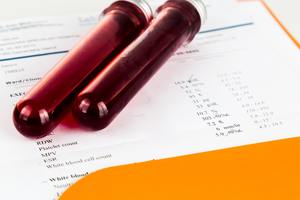Can a blood test predict cardiovascular disease? Let’s find out.
Dr. Christie Ballantyne believes that “if the first time you find out that you’re at risk for heart failure is when you actually start getting short of breath and you end up in the hospital, you probably have advanced heart disease already, and it is going to be harder to treat than if that person took steps years earlier.”
Fortunately, Dr. Ballantyne may have discovered a way to accurately predict whether someone will have a heart attack or a stroke before it happens.
Currently serving as the cardiology chief at Baylor College of Medicine in Houston, TX, Dr. Ballantyne and his team have discovered that scientists may be able to predict someone’s risk of developing cardiovascular disease.
Injured heart muscles release specific proteins. By checking the blood levels of these proteins, they may determine someone’s risk of cardiovascular disease.
How It Works

A simple blood test may tell you if you’re at risk for cardiovascular disease.
Can a blood test predict cardiovascular disease? When there is heart muscle damage, the heart releases proteins called troponins.
In their study, Dr. Ballantyne and his team analyzed the correlation between troponin levels and cardiovascular disease in healthy middle-aged adults and seniors.
Published in the AHA journal Circulation, the study found that there was a strong correlation between high levels of troponin and “increased global CVD incidence in the general population independent of traditional risk factors.”
“What we’re finding out is that these tests can be used in the general population to give us information as to who is most likely to have a future problem, whether it be a heart attack, stroke, or heart failure,” says Dr. Ballantyne.
“If you can treat someone much earlier, before [they] have symptoms, you will be far more effective in preventing events,” Dr. Ballantyne continues. “Our major problem is that we do too little too late.”
What’s Next?

Although the research seems promising, these methods are a tool for predicting risk for cardiovascular disease.
Heart attacks are currently diagnosed with troponin tests. However, we need more studies before they’re used to predict risk.
According to Dr. Rebecca Vigen, who did not participate in the study, “Research in this area is leading us toward individualized care more and more, so we can better predict who’s at risk for developing adverse cardiovascular outcomes.”
Dr. Vigen is currently an assistant professor of internal medicine at the University of Texas Southwestern Medical Center in Dallas, and believes that “this study is a step in the direction of personalizing care.”
Signs of Heart Disease
Meanwhile, it’s important to keep an eye on any possible signs and symptoms of heart disease.
For example, men are more likely to experience chest pain while women may experience other symptoms.
Along with chest discomfort, women are more likely to experience nausea, shortness of breath and extreme fatigue.
The cause of the heart disease also plays a factor in the symptoms you may experience.
For example, heart disease symptoms associated with heart arrhythmia include chest fluttering, both slow and racing heartbeats, lightheadedness, dizziness, and fainting.
On the other hand, heart disease associated with heart defects can manifest by easily getting short of breath during physical exercise, swelling in the hands and feet, and easily getting tired during exercise.
No matter the cause, if you experience chest pain, shortness of breath, and fainting, get emergency medical treatment right away.
The best time to treat heart disease is when it’s detected early, so talk to your doctor about monitoring your heart health and reducing the risks of cardiovascular disease.

